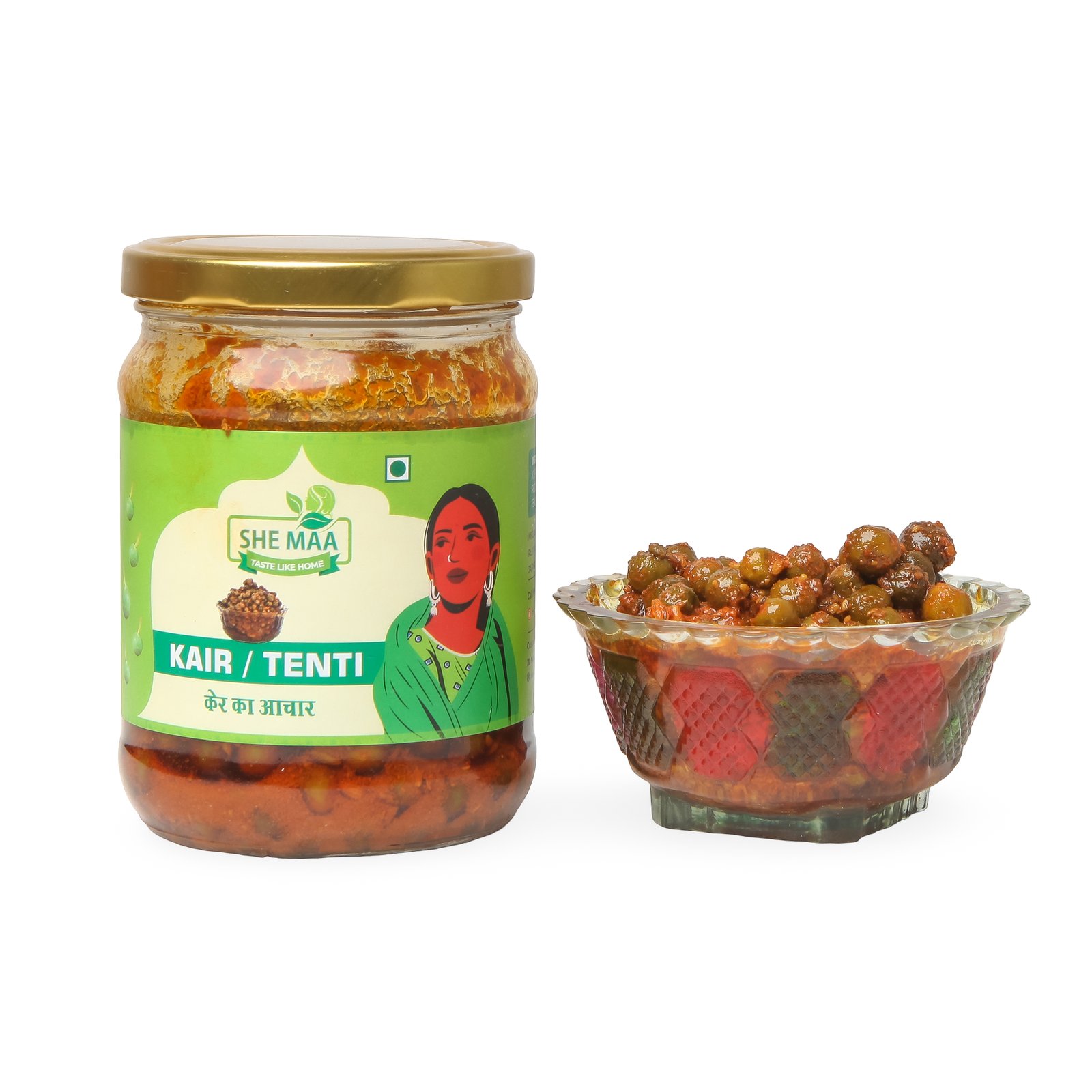
Rajasthani Kair Achar (ker/teent/ker ka achar)
Rajasthani Kair Achar (ker/teent/ker ka achar):
Kair pickle, also known as ker ka achar, is a traditional Rajasthani condiment made from the berries of the Capparis decidua shrub, commonly found in the arid regions of Rajasthan. This pickle is celebrated for its tangy, spicy flavor and is a staple in Rajasthani cuisine.
Culinary Uses of Kair Pickle
Kair pickle is a versatile accompaniment that enhances the flavor of various dishes:
- With Indian Breads: It pairs excellently with roti, paratha, and poori, adding a zesty kick to each bite.
- With Rice Dishes: Served alongside plain rice, khichdi, or pulao, it introduces a spicy contrast.
- In Traditional Dishes: It's a key ingredient in ker sangri, a classic Rajasthani dish combining kair and sangri beans.
- As a Flavor Enhancer: A small amount can be mixed into yogurt or salads to impart a unique tangy flavor.
Health Benefits of Kair Pickle
Beyond its culinary appeal, kair pickle offers several health benefits:
- Digestive Aid: The spices used, such as fennel and fenugreek, are known to aid digestion.
- Rich in Antioxidants: Kair berries contain antioxidants that help combat oxidative stress.
- Anti-inflammatory Properties: Traditional uses include relief from joint pain and inflammation.
- Nutrient-Rich: The berries are a source of vitamins and minerals, contributing to overall health.
Preparation and Storage
Kair pickle is prepared by sun-drying the berries and then marinating them in mustard oil with a blend of spices, including red chili powder, turmeric, and asafoetida. Proper storage in airtight containers ensures a shelf life of up to a year, maintaining its flavor and health benefits.
In summary, kair pickle is not only a flavorful addition to meals but also offers health advantages, making it a cherished component of Rajasthani cuisine.
Rajasthani Kair Achar (ker/teent/ker ka achar):
???? What Is Kair Achar?
- Made from kair berries (Capparis decidua), a hardy desert shrub fruit found across Rajasthan, especially in Jodhpur and Bikaner.
- Traditionally preserved in mustard oil with spices like mustard seeds, fenugreek, fennel, nigella, turmeric, chili, and asafoetida, then matured over days
- Typically paired with roti, paratha, dal, rice, khakra, mathri, and khichdi for a tangy, spicy kick.
✅ Benefits & Uses
1. Digestive Aid & Probiotic Support
- Pickles, including kair achar, stimulate the digestive fire with probiotic-spurring spices such as turmeric Specifically, kair is traditionally used to relieve constipation and other stomach issues .
2. Rich in Antioxidants
- Kair berries contain phenolics, glucosinolates, vitamin C, and other micronutrients which combat oxidative stress.
- As a result, pickled kair helps bolster immunity and protect liver and heart health 3. Medicinal Properties
- Used traditionally to treat rheumatism, joint pain, cough, asthma, fever, gout, dysentery, and kidney issues Scientific studies highlight anti-diabetic, anti-inflammatory, hepatoprotective, anticancer, antibacterial, and hypolipidemic effects .
3. Nutritional Value
- A 100 g serving provides ~42 kcal, 8.6 g protein, 12 g fiber, vitamin C, calcium, phosphorus, with some iron
- Contains electrolytic minerals like iron, zinc, calcium, and potassium
️ Safety & Moderation
- While healthful, pickles are high in sodium and should be eaten in moderation to avoid hypertension or bloating.
- Use sun-ripened, small kair berries and follow proper preparation to reduce bitterness (soak, boil, sun-dry)
???? Traditional Preparation at a Glance
- Soak and rinse fresh kair 2–3 days in salt water to remove bitterness
- Dry in sun and then sauté with mustard oil and spices
- Jar and mature, allowing 2–3 days or more for flavors to develop .
???? In Summary:
Kair achar is more than just a flavour-packed condiment. It's a cultural artifact, an ecosystem ally, and a functional food rich in antioxidants, digestive support, and medicinal benefits. Enjoy a small spoonful now and then with your meals to boost taste and well-being !
www.shemaastore.com


